-
What is General Dentistry?
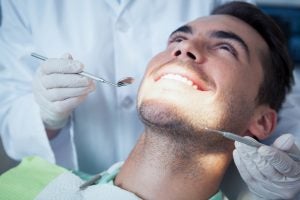
When following the recommended schedule, you’ll see your dentist twice a year. That’s more than you see other doctors, because while most doctors tend to the sick, dentists are primarily concerned with preventing problems. Most dentists practice general dentistry, and at a routine visit the dentist- with the help of dental assistants- will examine the mouth, provide a professional cleaning, and discuss the patient’s health and oral hygiene. But that’s not the entire scope of general dentistry. Let’s take a look at all the things that general dentists do.
- Preventive services are the mainstay of a general dentistry practice. Regular exams and professional teeth cleanings help patients maintain good oral health, as do preventive treatments like dental sealants. The dentist can also fit patients with active lifestyles for custom-made mouthguards.
- When there’s a problem, dentists provide restorative services. One of the most common restorative treatment is a filling. The dentist removes tooth decay and puts a filling in the damaged tooth. However, that’s not the only restorative procedure provided by general dentists. They can also provide treatment for dental trauma, like when a tooth has been broken, knocked out, or loosened. Dentists can also diagnose and treat tooth pain and gum disease, offer treatment for missing teeth, place crowns or bridgework, and fit patients for dentures. Some general dentists can also perform advanced treatments like root canal therapy, orthodontics, and dental implants.
- Often, general dentists perform cosmetic procedures to help improve their patients’ smiles. Teeth whitening, cosmetic bonding, and even porcelain veneers can be provided by your dentist’s office.
- General dentists are concerned with their patients’ overall health. Your oral health impacts and reflects the health of your body. For instance, infections in your mouth can impact your cardiovascular health, and people with diabetes are more susceptible to periodontal (gum) disease. General dentists can identify issues with your teeth than can have an impact on your health and offer treatment or referral when necessary. One condition dentists can screen for is obstructive sleep apnea, which can sometimes be treated with an oral appliance. General dentists are also qualified to provide nutritional counseling, advice about tobacco cessation, and general health and wellness information. They can also screen for oral cancer.
What qualifications are required for general dentistry? Dentists must successfully complete their undergraduate education and four years at an accredited dental school. They then have to fulfill testing and continuing education requirements of state licensing boards. Dentists may have the initials DMD or DDS following their names, but they all have the same education and training.
At Park 56 Dental Group, we offer pediatric, prosthodontics, endodontics, oral surgery, Invisalign®, emergency, and sedation dentistry, all at the highest level of treatment. We serve the Midtown, Central Park, Upper East Side, Park Avenue, and all surrounding Manhattan and New York areas, with a patient-centered practice that has hours to fit your schedule. Schedule your complimentary consultation today by contacting us online or calling us at (212) 826-2322.
-
Dental Terms to Know
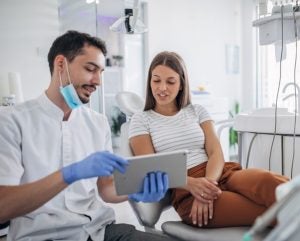
When you visit the dentist, you may sometimes hear terms you don’t understand. This is not unusual, because dentists often use very specific medical terminology that is unfamiliar to most patients. If you aren’t sure what the dentist is talking about, you should always ask questions, so that you’ll understand what’s going on with your mouth. In the meantime, here’s a list of common dental terms that are good to know.
- Abrasion: Tooth wear caused by forces other by eating.
- Abutment: Tooth or implant supporting a dental prosthesis.
- Anesthesia: General anesthesia is a controlled state of unconsciousness, intravenous sedation is depressed consciousness that’s medically controlled, and local anesthesia, also called regional, is the loss of sensation without the loss of consciousness.
- Arch: An upper or lower denture.
- Bicuspid: Premolar tooth with two cusps.
- Bilateral: Occurring on both sides.
- Bonding: Composite resin applied to a tooth to change its color or shape.
- Calculus: Hard deposit of mineralized material on crowns or the roots of teeth.
- Composite: Restorative material made of a mixture of parts.
- Dentin: The inner layer of the tooth, protected by enamel and encasing the tooth’s pulp and nerve.
- Dry mouth: When the mouth doesn’t produce enough saliva- untreated, it can lead to increased levels of tooth decay and mouth infections.
- Enamel: Hard outer layer of the tooth, made of minerals.
- Excision: Surgically removing bone or tissue.
- Extraction: Removing a tooth or tooth parts.
- Fluoride: A natural mineral that makes the tooth’s exterior resistant to decay.
- Implant: A permanent replacement for missing teeth, surgically placed in the jawbone to anchor replacement teeth, a dental bridge, or dentures.
- Invisalign®: Clear, removable, dental aligners for mild to moderate orthodontic issues.
- Laser dentistry: Lasers are used for tooth decay removal, gum disease treatment, root canal therapy, and teeth whitening.
- Oral surgery: Dental specialty that corrects problems or damage to the teeth, mouth, and jaw.
- Periodontal disease: Gum disease. Gingivitis is an early stage.
- Plaque: Sticky film that forms on teeth as bacteria breaks down that causes decay if not removed.
- Radiograph: X-ray
- Root: Portion of the tooth located in the socket.
- Scaling: Removal of plaque, calculus, and stain from teeth.
- Sealant: Plastic resin applied to the biting surfaces of molars to prevent caries.
- Sedation dentistry: The use of medication to help patients relax during dental procedures.
- Tartar: Hardened plaque that can only be removed by scaling.
- TMJ: Temporomandibular joint, the hinge mechanism between the base of the skull and the lower jaw.
- Veneer: Tooth-colored material attached to the tooth surface.
At Park 56 Dental Group, we offer pediatric, prosthodontics, endodontics, oral surgery, Invisalign®, emergency, and sedation dentistry, all at the highest level of treatment. We serve the Midtown, Central Park, Upper East Side, Park Avenue, and all surrounding Manhattan and New York areas, with a patient-centered practice that has hours to fit your schedule. Schedule your complimentary consultation today by contacting us online or calling us at (212) 826-2322.
-
How Often Should You Be Going to the Dentist?
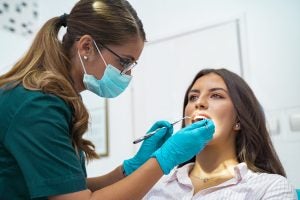
How often do you see your dentist? About one hundred million Americans skip out on regular dental checkups, even though seeing a dentist regularly is vital for good oral health. Your dentist probably encourages you to come twice a year, but is that really necessary?
Truthfully, there’s little research supporting the twice a year recommendation. So, how often should you be going to the dentist? It depends on a few factors. Some people need to go to the dentist more than twice a year. This high-risk group includes pregnant women, smokers, people prone to plaque build-up or cavities, those who have gum disease or diabetes, and anyone with a weak immune response. People who practice excellent oral hygiene and show no signs of gum disease or cavities may be able to get away with going to the dentist less often than twice a year, but that is something to discuss with the dentist.
Even if you’re diligent about brushing twice a day and flossing daily, seeing your dentist regularly is important. That’s because dentists and dental hygienists can spot problems you can’t see and prevent them from becoming major issues. When you go to the dentist, here’s what you can expect:
- X-rays: At the beginning of your appointment, the dental hygienist will take any x-rays you need so that the dentist can look at them while your teeth are being cleaned.
- Cleaning and Polishing: Using scalers and other dental tools, the hygienist will gently remove plaque and tartar from tooth surfaces and just below the gum line. Your teeth will then be polished with a paste, and the hygienist will floss between your teeth. During the cleaning, the hygienist will let you know if there are any areas to which you need to pay more attention when brushing and flossing, and instruct you on proper brushing and flossing techniques.
- Oral cancer screening: By examining your palate, tongue, throat, inside of cheeks, and other parts of your oral cavity and feeling the outside of your jaw and throat, your dentist will be able to spot any signs of cancer. Because oral cancer is most successfully treated when detected early, this screening is very important.
- Cavity detection: The dentist will examine your teeth for cracks, chips, decay or other damage, and the hygienist will chart any teeth that require treatment.
- Gum assessment: Your dentist will check for signs of gingivitis or periodontal disease. Gum disease is reversible when detected in the early stages.
- Dental appliance check: Because dental appliances don’t last forever, the dentist will check to see if anything needs replacing.
At Park 56 Dental Group, we offer pediatric, prosthodontics, endodontics, oral surgery, Invisalign®, emergency, and sedation dentistry, all at the highest level of treatment. We serve the Midtown, Central Park, Upper East Side, Park Avenue, and all surrounding Manhattan and New York areas, with a patient-centered practice that has hours to fit your schedule. Schedule your complimentary consultation today by contacting us online or calling us at (212) 826-2322.
-
9 Celebrities Who Have Worn Invisalign

Do you wish you had straighter teeth? If you don’t want to be a “metal mouth,” you may think you’re stuck with an imperfect smile forever. Luckily, there’s another way. You can straighten your teeth the way celebrities do—with Invisalign! You’ll be shocked to learn that some of your favorite movie stars, singers, and public figures have worn Invisalign over the years.
- Tom Cruise: While filming Minority Report in 2002, Tom donned nearly invisible braces to discreetly straighten his teeth. He was 40 at the time and opted for an invisible choice so as not to tarnish his dashing good looks.
- Justin Bieber: This young pop star rose to fame in his early teens, but he dealt with crowded teeth behind the scenes. Justin improved his smile with Invisalign back in 2011, sharing his experience with fans on YouTube. His teeth have been straight ever since.
- Oprah Winfrey: As one of the world’s most influential people, it’s no wonder Oprah chose to straighten her teeth with Invisalign. She felt so confident in her aligners that she didn’t hesitate to wear them in front of the camera while filming her award-winning talk show.
- Zac Efron: He started as a teen sensation in Disney’s High School Musical, but once he began taking on more adult roles, Zac decided it was time to close the gap between his front teeth, a condition called diastema. How did he do it? With Invisalign.
- Eva Longoria: Best known for her role in Desperate Housewives, Eva decided her smile needed a little tweaking at 36 years old. Instead of turning to traditional metal braces, she chose Invisalign to discreetly correct the alignment of her bottom teeth.
- Katherine Heigl: Like many blushing brides, Katherine wanted straight teeth for her wedding photos. She started wearing Invisalign in 2007 to fix her misaligned teeth and repeatedly told interviewers how pleased she was with the results.
- Serena Williams: This star tennis player is a multiple Grand Slam tournament winner. She has seemingly always had straight teeth, but she wore Invisalign as a teenager. Thanks to that treatment, she has always smiled with confidence when celebrating her big wins.
- Kate Middleton: As reports have it, the Duchess of Cambridge donned Invisalign for six months leading up to her wedding to Prince William. Kate’s French orthodontist recommended the aligners to perfect her smile just in time for the big day.
- Khloe Kardashian: The youngest of the Kardashian sisters decided to start Invisalign treatment in 2013. The wire-free option proved to be the right method for straightening her teeth. Still, she wasn’t shy about it, even tweeting “thank you” to her dentist for handling the entire process.
When it comes to achieving the perfect smile, nothing is more comfortable, convenient, or discreet than Invisalign. If you’re ready to straighten your teeth the invisible way, please call Park 56 Dental at (212) 826-2322 or contact us online to schedule a free consultation.
-
How to Stop and Reverse Tooth Decay
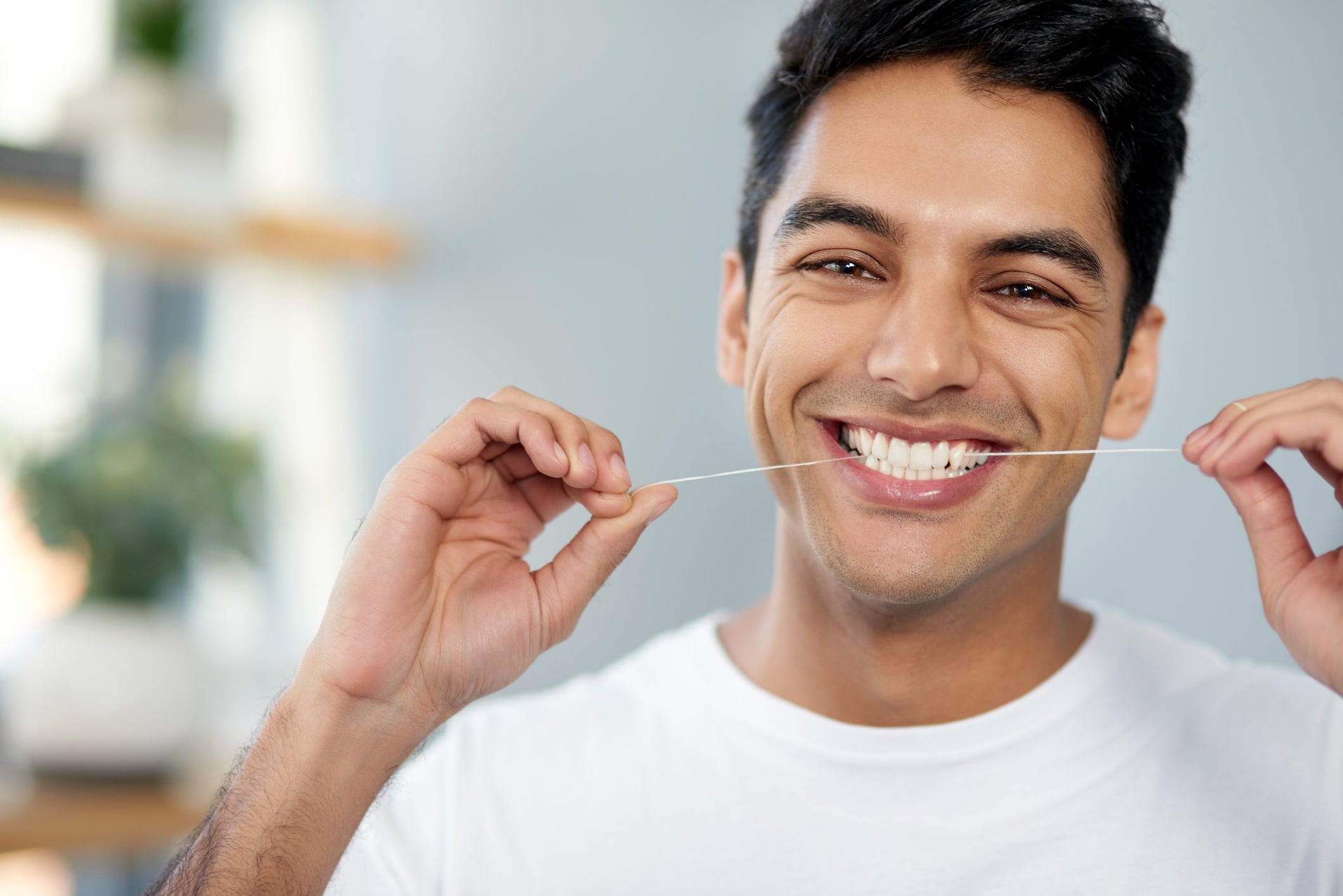
Tooth decay is the slow destruction of the tooth surface, which can lead to cavities, abscesses, and even tooth loss. Plaque is the root cause of tooth decay. This clear, sticky film comprised of bacteria, acid, and food particles clings to the surface of your teeth and causes damage over time. If left untreated, plaque hardens into tartar, a brown, gum-irritating substance that requires professional dental cleaning to remove.
The key to stopping and reversing tooth decay is to remove plaque from your teeth every day so it doesn’t have time to form tartar. Better yet, prevent plaque from forming in the first place by adjusting your diet and oral care routine. Here’s what we recommend.
- Brush your teeth: Every morning and evening, brush your teeth with a soft-bristled toothbrush and fluoride toothpaste. If possible, brush after meals as well.
- Floss: Remove stubborn particles and plaque from between your teeth with dental floss. Flossing also stimulates your gums and removes hard-to-reach bacteria from along the gum line.
- Rinse with mouthwash: Choose a fluoride rinse to strengthen your teeth. Look for products with antiseptic ingredients as well, which kill plaque-causing bacteria and freshen your breath.
- Eat tooth-friendly foods: Add more fresh fruits and vegetables to your diet to help scrub your teeth and increase saliva flow while you eat. Then, limit your intake of sweets, including candy, cookies, juice, and soda.
- Avoid frequent snacking and sipping: Your saliva doesn’t have a chance to rinse away food particles if you snack or drink sugary beverages all day. Snacks that get stuck in your teeth—such as bread, crackers, and potato chips—are particularly detrimental.
- Chew sugar-free gum after meals: If brushing isn’t an option, the next best thing is to chew sugarless gum. Xylitol-sweetened chewing gum is especially beneficial. It tastes sweet, but xylitol doesn’t convert into acid in the mouth, reducing the level of decay-causing bacteria in your saliva.
- Drink tap water: The tap water in NYC is fluoridated. Drinking and rinsing your mouth out with this water is an effortless way to help stop tooth decay.
- Visit your dentist regularly for routine cleanings and exams: No amount of at-home care can replace visiting the dentist. Only professional tools can remove tartar and restore your smile. Plus, exams are important for catching and treating minor dental problems before they become more serious.
- Ask your dentist about fluoride treatment: All children and adults with a high risk of tooth decay should seek fluoride treatment. This is available from your dentist, so bring it up at your next appointment.
If it’s been more than six months since you last saw a dentist, visit Park 56 Dental in NYC for a routine cleaning and exam. We offer personalized tips to stop and reverse tooth decay, making it easy to maintain your healthy, beautiful smile. Call us at (212) 826-2322 today or contact us online to schedule your appointment. You’ll love the spa-like experience we provide!
-
Why You Should be Excited about Going to the Dentist

When was the last time you felt genuinely excited about going to the dentist? For many people, it’s nothing but a chore. For others, dentist visits are downright stressful. If you have had a bad experience, dealt with rude dentists, or suffered through painful appointments in the past, switch to Park 56 Dental. Here’s how we make our patients excited to visit the dentist.
- We improve your oral health: Routine dentist visits are the best way to catch and treat dental problems early. Stop worrying if that minor toothache is going to get any worse, and have it checked out! While you’re here, we’ll look for hidden problems using X-rays and treat developing concerns right away. Exams also include an oral cancer screening for your peace of mind.
- Our dental services improve your overall health: Do you know about the connection between oral health and cardiovascular disease? Taking good care of your teeth and gums can even decrease the risk of diabetes, dementia, rheumatoid arthritis, and other seemingly unrelated conditions. Who doesn’t get excited about having a clean bill of health?
- Our routine cleanings and oral exams save you money: While restorative dentistry can improve your smile, it’s best to avoid cavities, staining, and tooth loss if at all possible. Affordable, preventative dental care can stop problems before they start, saving you the time, hassle, and expense of restoring your smile later on.
- We provide dental advice: Not sure what toothbrush you should buy for your sensitive gums? Want recommendations to keep your stain-prone teeth looking whiter? Ask for personalized advice at your next dentist appointment.
- You’ll leave our office with clean teeth and fresh breath: No amount of brushing and flossing can remove tartar, the hard, brown substance that forms if plaque accumulates in your mouth. Tartar stains your teeth and can cause bad breath, but the only way to remove it is with a professional dental cleaning. You’ll love how clean your mouth feels and how fresh your breath smells when you leave our office!
- We accept most dental insurance plans: If you have dental coverage, put it to good use by visiting us twice a year. You’ll get satisfaction out of knowing you’re maximizing your benefits. We also accept major credit cards and Care Credit for any services not covered by insurance, with flexible payment options available if needed.
- You’ll spend time in our patient-centered, spa-like office: We cater to a clientele that appreciates personalized, quality dental care. Expect our knowledgeable, compassionate dentists to meet your individual needs, whether you’re naturally excited to be here or struggle with dental anxiety.
There’s a reason Park 56 Dental has been voted NYC’s best dentist! Our services are ideal for the whole family. Visit us for general and cosmetic dentistry, prosthodontics, endodontics, oral surgery, Invisalign, emergency services, and sedation dentistry. When you’re ready for your complimentary consultation, please call us at (212) 826-2322 or contact us online.
-
The Link Between COVID-19 and Your Teeth and Oral Health
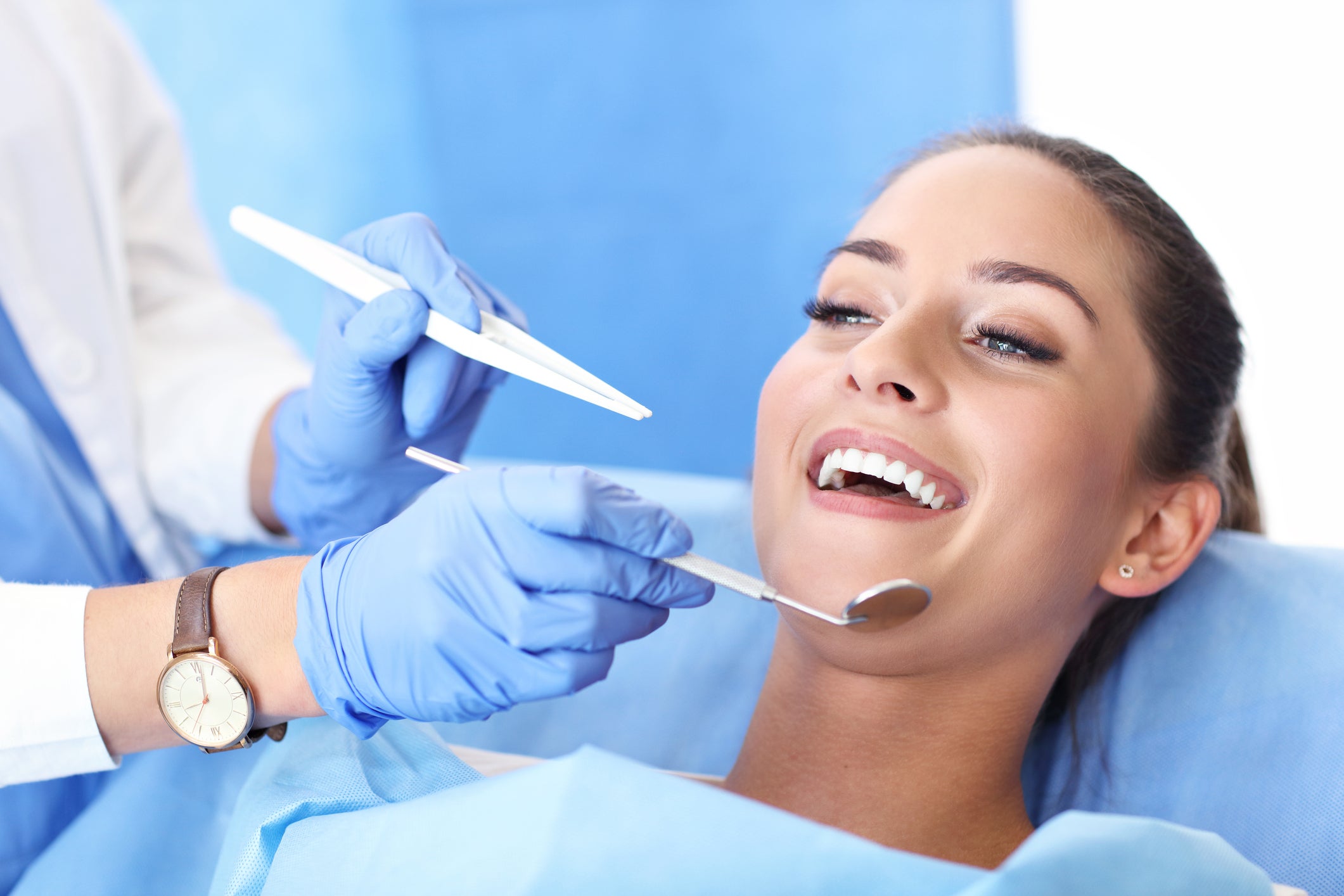
Every patient reacts to the novel coronavirus differently. Some people have difficulty breathing or experience weeks of severe fatigue. Others develop a high fever or lose their sense of taste and smell. Recent evidence suggests that the infection may also impact a patient’s teeth and gums. Learn which oral health conditions have been linked to COVID-19.
Gum Disease and Inflammation
Doctors believe that COVID-19 raises cytokine and interleukin levels in the body, which leads to a generalized increase in inflammation. Painful, inflamed gums are a common side effect in patients with elevated cytokines and interleukins.
It also appears that people with gum disease are far more likely to be admitted to the ICU, require a ventilator, or pass away from COVID-19 than people without existing oral health problems. Doctors suspect this is the case because gum disease causes systemic inflammation, which only worsens when the coronavirus infection sets in.
Dry Mouth
If COVID-19 infects the salivary glands, the quality and quantity of saliva are diminished. Lack of saliva can lead to dry mouth, also known as xerostomia.
The need to wear masks during the pandemic means that even those who have not contracted COVID-19 are at a higher risk of dry mouth. Many people breathe through their mouth to increase air intake while wearing a mask, which can dry out oral tissues. Wearing a mask also makes it more difficult to drink water throughout the day, leading to dehydration and dry mouth.
Low Blood Flow to Oral Tissues
The coronavirus damages blood vessels, which can lead to oxygen deprivation throughout the body, including the mouth. This can cause sensitive gums, oral ulcerations, and tissue breakdown, all of which are exacerbated by the increased inflammation found in people with COVID-19.
Disrupted blood flow to the mouth can also cause teeth to turn gray, become loose, and fall out with no blood loss. These problems, along with other dental flare-ups, may occur months after recovering from COVID-19.
Cracked Teeth
Since the pandemic started, dentists around the country have reported a tremendous increase in patients with fractured teeth, even among those who have never contracted COVID-19. The likely culprit is an increase in nighttime tooth grinding, also known as bruxism. Three pandemic-related factors could be to blame for rising cases of bruxism in the past year—stress, sleep deprivation, and poor orthopedic posture caused by makeshift at-home workstations.
Whether you have contracted COVID-19 or not, one of the best ways to protect your teeth and gums is to visit the dentist regularly. Park 56 Dental in NYC is taking steps to prevent the spread of COVID-19 in our office, making it safe for anyone without symptoms to seek in-person care.
Let us help you combat oral health concerns resulting from the pandemic. We also provide routine cleanings and exams to prevent dental problems before they start. To schedule an appointment at our spa-like dentist office, please call Park 56 Dental at (212) 826-2322 or contact us online.
-
Debunking Dental Myths

Do you know the facts about your teeth and dental health? You’d be surprised at how many things people believe that just aren’t true. Here, we debunk some common dental myths and give you the real scoop.
- Myth 1: You should brush your teeth immediately after eating. In fact, it’s better to wait at least 30 minutes after a meal. Saliva offsets the acids in the foods you eat; waiting to brush gives it a chance to do its job.
- Myth 2: Kids don’t need the dentist until their permanent teeth come in. You might think that it doesn’t matter if baby teeth have cavities, but it’s important to care for those first teeth. Children should see a dentist before their first birthday.
- Myth 3: If your gums bleed, that means you need to stop flossing. Gums bleed because of inflammation caused by bacteria and plaque stuck between the teeth. Get into the habit of flossing every day, and eventually the bleeding and inflammation will go away.
- Myth 4: Brushing your teeth hard will get them cleaner. Brushing too hard or using a toothbrush that’s too firm can erode your enamel and damage your teeth, as well as causing your gums to recede.
- Myth 5: If your teeth are sensitive, it’s because you brushed them too hard. While it’s important to be gentle with your teeth, there are many factors that can cause sensitivity, like gum recession and the use of whitening toothpastes.
- Myth 6: Swishing with mouthwash is just as good as brushing. Mouthwashes can freshen breath and sometimes contain fluoride, but they’re no substitute for brushing when it comes to removing sticky plaque.
- Myth 7: Sugar rots your teeth. It’s not the sugar itself, but rather leaving it on your teeth that causes decay. Brushing twice a day keeps cavities at bay.
- Myth 8: Everyone needs the same dental care, regardless of health or life stage. Certain health conditions, like diabetes, require a very specific oral healthcare plan.
- Myth 9: If you don’t feel like anything is wrong with your teeth, you don’t need to see the dentist. It’s important to see the dentist twice yearly, even if you think you’re fine. Dentists can catch issues like gum disease, cavities, and even oral cancer early, before they become major problems.
- Myth 10: The care you take of your teeth only affects your mouth. Your oral health has a major impact on your entire body, and poor oral healthcare has been linked to cardiovascular disease, diabetic complications, respiratory issues, dementia, and more.
At Park 56 Dental Group, we offer pediatric, prosthodontics, endodontics, oral surgery, Invisalign®, emergency, and sedation dentistry, all at the highest level of treatment. We serve the Midtown, Central Park, Upper East Side, Park Avenue, and all surrounding Manhattan and New York areas, with a patient-centered practice that has hours to fit your schedule. Schedule your complimentary consultation today by contacting us online or calling us at (212) 826-2322.
-
Invisalign for Teens
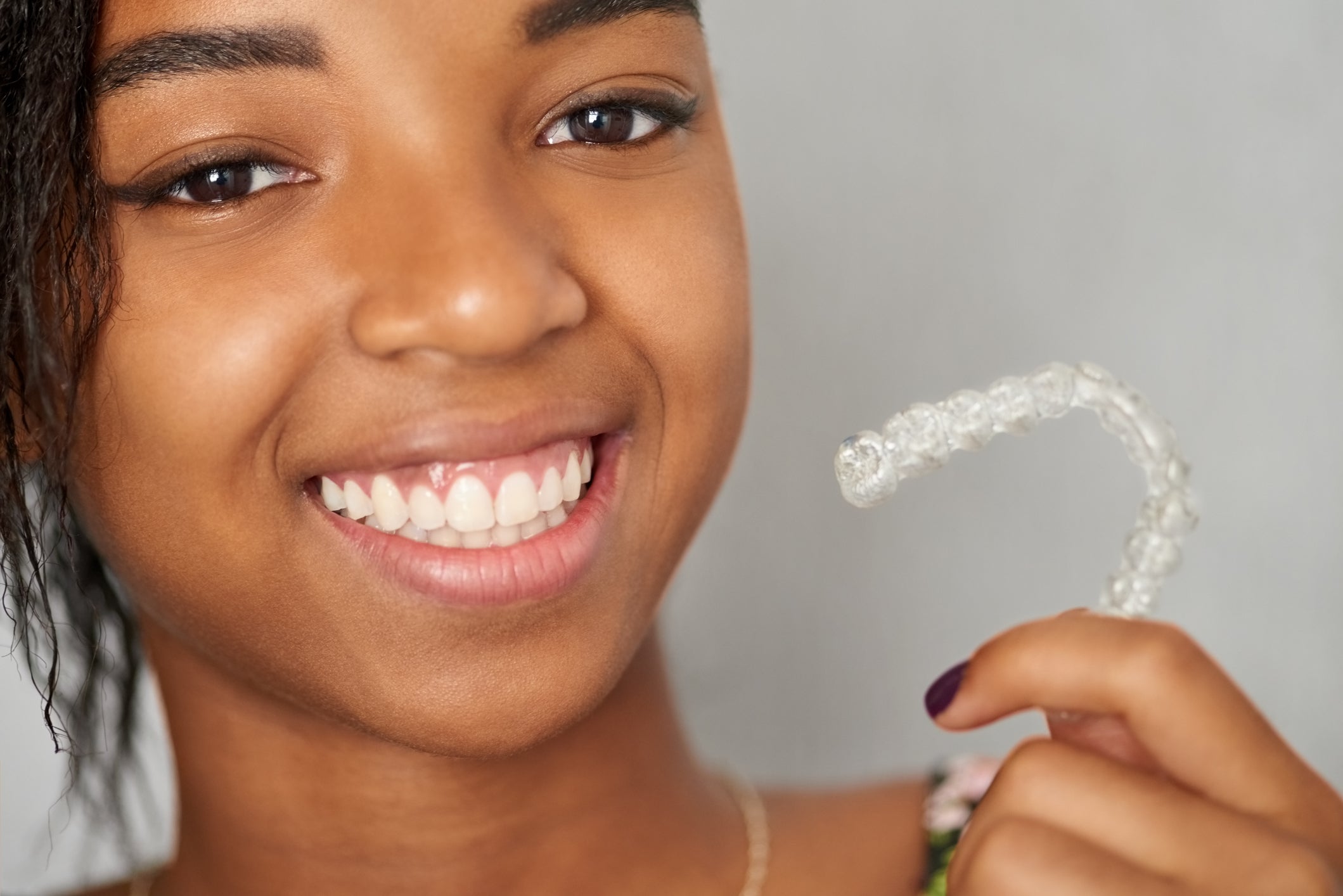
Does your teenager need braces? Sometimes, teeth need to be straightened during the middle and high school years, but that’s also when teens are often most sensitive about their appearance. How can you help your teenager feel confident while still providing the orthodontic care necessary for long-term oral health? Invisalign® may be the answer. A revolutionary way to straighten teeth, Invisalign uses customized aligners to shift teeth without the discomfort and unattractive look of metal braces.
- Invisalign® aligners are practically invisible. Made from a soft, clear plastic, Invisalign® aligners are so discreet that people are unlikely to even notice you’re wearing them! Invisalign® Teen, created especially for teenagers, are non-invasive so that teens can feel confident while wearing them.
- Because they’re removable, Invisalign® aligners don’t require a special diet. With traditional braces, you have to be careful about eating things like popcorn or hard food. Invisalign® aligners are removable, so you can take them out when you’re eating and eat whatever you want. What’s more, because you take them out to brush and floss, it’s easy to take care of your teeth.
- Invisalign® is more comfortable than traditional metal braces. Metal braces can feel tight or rub against the inside of your mouth, causing discomfort or even pain. Invisalign® Teen is made from moldable plastic and specifically customized for your teen’s mouth, so you can be sure of a comfortable fit.
- Teens can keep participating in the activities they love while wearing Invisalign®. Whether they’re playing sports or playing instruments, teenagers don’t have to worry about Invisalign® getting in the way. The aligners are easy to take out and put back in after the activity is finished.
- Invisalign® works for many different issues. Underbites, overbites, and crossbites can be fixed with Invisalign, as well as crowded or widely-spaced teeth. Invisalign® is great for most mild to moderate orthodontic problems; during a consultation, your dentist can evaluate your teen’s mouth to see if this treatment is a good fit. What’s more, Invisalign® often works more quickly than traditional braces, so the treatment doesn’t take as long.
- You and your teenager need to understand that Invisalign® is a commitment. Each aligner needs to be worn for two weeks, and the whole process takes anywhere from a few months to three years. The aligners don’t have to be worn all the time, but they do have to be worn about 20-22 hours each day. Additionally, Invisalign® requires frequent trips to the orthodontist for checkups and to make sure the treatment is progressing on schedule.
At Park 56 Dental Group, we offer Invisalign®, along with pediatric, prosthodontics, endodontics, oral surgery, emergency, and sedation dentistry, all at the highest level of treatment. We serve the Midtown, Central Park, Upper East Side, Park Avenue, and all surrounding Manhattan and New York areas, with a patient-centered practice that has hours to fit your schedule. Schedule your complimentary consultation today by contacting us online or calling us at (212) 826-2322.
-
The Benefits of Straighter Teeth
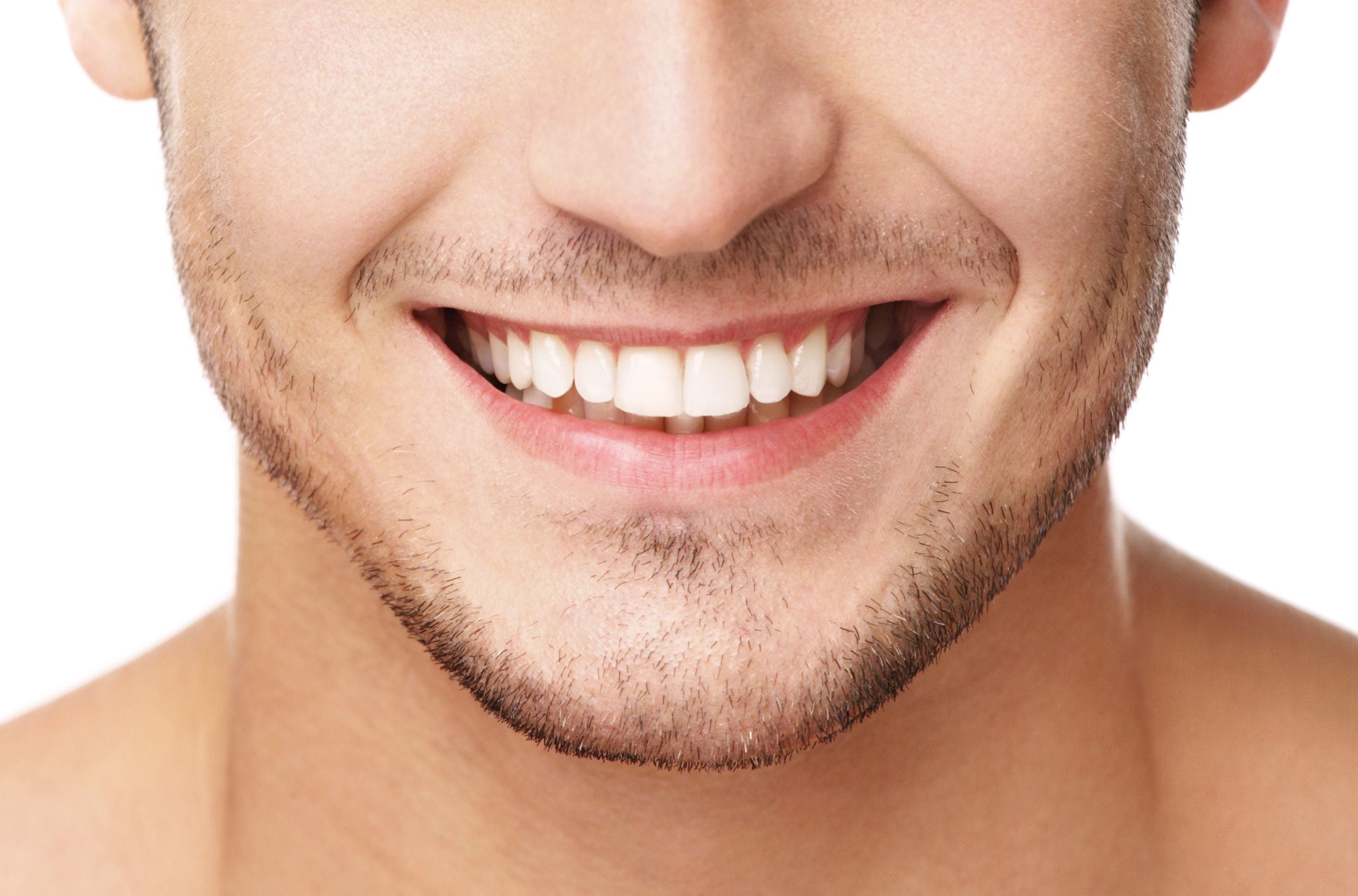
If you’re thinking of having your teeth straightened, you’re probably thinking about the cosmetic benefits. About a million adults in the U.S. wear braces, most of them because they want the look of perfectly straight teeth. Would it surprise you to learn that the benefits of straighter teeth go far beyond the way you look? Read on to learn more.
- Straight teeth are easier to clean. When your teeth are crooked or crowded, it can be hard to thoroughly clean them, getting between every space and crevice. This can lead to cavities, periodontal disease, and other oral health issues.
- Because they help you keep your mouth healthier, straight teeth are better for the overall health of your body. Cleaning your teeth removes bacteria, preventing infections from spreading throughout your body. Unhealthy mouths have been linked with a variety of health conditions like diabetes, heart disease, respiratory problems, and dementia.
- Straight teeth help your digestion. This is obvious if you think about it, because chewing is the first step of the digestion process. When you’re better able to chew your food, the rest of your digestive system doesn’t have to work as hard.
- You’ll speak more clearly with straighter teeth.Teeth that are crowded, gapped or protruding teeth can negatively impact your speech patterns. Lisps and other speech impediments are more likely with crooked teeth. When your teeth are straight, your speech will be clearer, boosting your self-confidence.
- Straight teeth last longer. They’re less likely to break, crack, or decay and fall out. When your teeth are straight, there’s less wear and tear placed on your teeth, gums, and jaw when you bite and chew. Improper alignment can prematurely wear teeth down, causing chipping and notching at the gum line, fractures in the teeth, and abnormal flattening of the biting surface.
- Neck, head, and jaw pain can be reduced when teeth are straightened. Crooked teeth can contribute to jaw misalignment, straining the joints of the jaw and leading to temporomandibular joint (TMJ) disorders, which can cause ear problems, dizziness, and chronic neck, face, and head pain.
- You’ll sleep better if your teeth are straighter. Crooked teeth can contribute to problems like sleep apnea and tooth grinding.
- Straight teeth can make you feel more confident. When your teeth are crooked or misaligned, it can make you feel insecure or unattractive. Havin them straightened can improve your self-esteem, which improves your mental and physical health. You’ll be less likely to feel depressed or anxious, and more likely to feel confident and sure of yourself.
At Park 56 Dental Group, we offer pediatric, prosthodontics, endodontics, oral surgery, Invisalign®, emergency, and sedation dentistry, all at the highest level of treatment. We serve the Midtown, Central Park, Upper East Side, Park Avenue, and all surrounding Manhattan and New York areas, with a patient-centered practice that has hours to fit your schedule. Schedule your complimentary consultation today by contacting us online or calling us at (212) 826-2322.
RECENT POSTS
categories
- Uncategorized
- Cosmetic Dentistry
- Veneers
- Healthier Teeth
- Teeth Whitening
- Dental Health
- Video
- Dental Emergencies
- Invisalign
- Dental Implants
- Root Canal
- Sedation Dentistry
- Infographic
- Dental Crowns and Bridges
- Dental Anxiety
- Gum Disease
- COVID-19
- Bad Breath
- New York Dentist
- Cut out sugar
- General Dentistry
- Oral Health
- Oral Cancer
- Dry Mouth
- Gum Health
- Toothache
